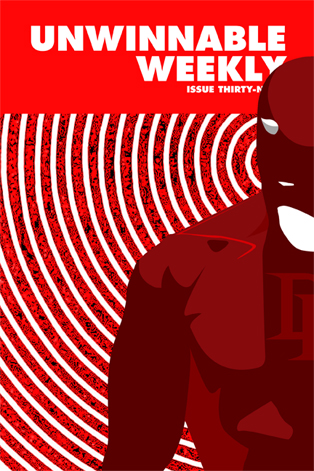
Divine Constraint
 I was surprised a few weeks ago to see multimedia artist and developer Merritt Kopas tweet a link to what she called “a tiny new game about French Christian mysticism.” Videogames about explicitly religious themes are rare enough, but the announcement was particularly unexpected coming from Kopas, whose work has more typically explored the intersection between kink and interpersonal concern.
I was surprised a few weeks ago to see multimedia artist and developer Merritt Kopas tweet a link to what she called “a tiny new game about French Christian mysticism.” Videogames about explicitly religious themes are rare enough, but the announcement was particularly unexpected coming from Kopas, whose work has more typically explored the intersection between kink and interpersonal concern.
Those interests have led her to design videogames like Consensual Torture Simulator, but also to ongoing commitments like Soft Chambers, a multi-work project consisting of small, conceptual games that she says are “partly about games as spaces for receiving care and partly about games as sites for practicing giving care.”
The latest is Obéissance, a browser-based work patterned after 2D platformers and inspired by the work of French political activist and Christian theologian Simone Weil. Drawn from an early age to the causes of the downtrodden, Weil had participated in worker strikes in France, lent aid to German communists escaping the rising Nazi regime and narrowly avoided dying in an anarchist platoon in the Spanish Revolution. It was while recuperating from the Revolution that she experienced a religious epiphany at the birthplace of St. Francis Assisi, an Italian friar whose October 4 feast day celebration is part of the Christian calendar of saints.
Though Weil remained politically engaged (her death was the result of complications arising from a hunger strike in solidarity with the citizens of German-occupied France), she steadily turned her attention to the spiritual implications of suffering. Weil suggested, among other things, that humans might transcend their suffering by more fully embracing the will of God. She wrote trenchantly about the need to remove personal obstacles to that will, a process Weil called “decreation”. Stripped of impediments, the Christian is left waiting for God.
Kopas has also written about the transformative value of waiting. “In that respect,” Kopas recently told me, “it’s unsurprising her approach resonated with me.” So while the single, repeating stage of Obéissance may seem to encourage the sort of progress familiar from videogame franchises like Super Mario World and Castlevania, the Weil quotations that accompany each platform exhort players to surrender the illusion that their actions amount to control. The trick is to desire what cannot, in any case, be avoided.
Unwinnable: A lot of the themes that characterize your work show up in Obéissance, but theology seems like a new direction.
Merritt Kopas: I think that’s a fair assessment.
Unwinnable: Is that something that came out of reading Simone Weil, or did you go to Weil because you wanted to do something involving theology?
M.K.: More the former. I’d heard of Weil in passing from a few friends over the past couple of years, but had never gotten around to reading her. I actually have a pretty terrible track record when it comes to reading books I set out to, but I started listening to audiobooks recently and saw that a collection of her work was available. I listened through the whole thing in a week or so, and was reflecting on it a lot afterwards and the game came out of that.
Unwinnable: Your friends were recommending Weil because you had those themes (consent, constraint, etc.) in common?
M.K.: Actually, no, that was just kind of a happy coincidence. All I knew about her going in was this vague idea of decreation, I had no idea those were going to be strong themes in her work.
Unwinnable: So when those ideas started popping up, was it an automatic affinity, or did her handling of those themes conflict with your own?
M.K.: It was kind of complicated, because historically I have not been what you would call a religious person. So when she talks about obedience to God there is this part of me that resists and wants to push back against that. I was a teenage movement atheist and I think that background still inflects my thinking whether I want it to or not.
But the passage about obedience and necessity, which ended up composing most of the text in the game, was really compelling to me. It was sort of an approach to determinism that I hadn’t really encountered before, the idea that you have a choice but your choice is in desiring obedience or not, and this choice somehow has consequences.
You’ve been reading an excerpt from Unwinnable Monthly Issue 39.
To read the article in its entirety, please purchase the issue from the shop or sign up for a subscription to Unwinnable Monthly!





